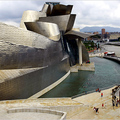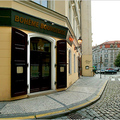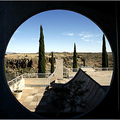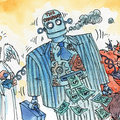IT is late afternoon, and Momofuku Ssam Bar in the food-fixated East Village is idling in self-service mode waiting for the cocktail crowd — pretty much indistinguishable from the pierced and tattooed waiters — to saunter in.
The lights are dim, Pearl Jam growls on the sound system, and David Chang, the somewhat conflicted recipient of this year’s James Beard Foundation rising star award for best new chef, is hunched over a legal pad irritably compiling a list of incentives to help lure fresh cooks to his growing Momofuku empire. The list contains dollar signs and seems to consternate him. As does having to part from the list to pull his weight in an interview.
Instant message: culinary stardom can be aggravating.
The burly Mr. Chang, whose previous careers included junior golf champion (he burned out at 13) and entry-level Park Avenue financial functionary (he got drunk at the office Christmas party and burned his bridges) never plotted to become a celebrity chef. An ambassador of celestial ramen noodles and all things porcine at the place he calls his baby, Momofuku Noodle Bar, maybe.
His advice to vegetarians and snooty diners is to go eat someplace else. Not here at the Ssam Bar (a Beard Foundation nominee for best new restaurant), nor at Ko (it means “son of” in Japanese), which will open in Noodle Bar’s spot when the mother ship moves to larger quarters at the end of the summer.
Diners seeking a slicker epicurean environment may find it at a Las Vegas-based Momofuku he is thinking of opening. (This may be the reason for the wanted-style poster of a major casino magnate in a staff-only stairwell. He is, it warns, a V.I.P. who must be “seated immediately.”)
As for tooting his own horn to the news media, Mr. Chang says he was encouraged to do so by his Momofuku partner and co-chef, Joaquin Baca, the only player who wanted in when he conceived the noodle bar. Mr. Baca, married, even-tempered, and a whiz at mixing flavors in uncannily tasty ways, plays “the good cop” role. Mr. Chang skews high-strung, same as his blood pressure.
“I don’t believe in that whole superstar celebrity chef thing,” he says. “I’ve worked in too many kitchens where the egos got in the way of the food. I appreciate the honor; it’s amazing, but it’s also surreal and absurd. Sometimes I feel like I’m on ‘The Truman Show.’ I always considered myself one of the worst cooks in any kitchen I ever worked at.”
He backs that up by recalling the impact he had on his cooking partner at the French Culinary Institute: The partner dropped out. Mr. Chang persisted and it paid off: Craft, Mercer Kitchen, Park Hyatt Tokyo (to refine his noodlemania), and Café Boulud employed him before he opted for independence via a lowly noodle bar.
“I think our stuff is overrated,” he confides. “And now I feel sort of like a hypocrite because I’m doing less and less cooking and more business. I never intended this to happen. People say, ‘Oh, he’s a genius, he’s so talented,’ but it’s all hype. Who cares about that fluff?” he asks.
Mr. Chang, 29, has a Diet Dr Pepper in one fist — he avoids sugar highs. In place of tattoos, his arms and hands are speckled with scars from cooking mishaps (he has a dangerous relationship with sharp knives and a speed-dial relationship with several hospital emergency rooms). But that’s not why he wants to delegate the kitchen duties. “New York City has too many restaurants and not enough cooks,” he says. “Cooking doesn’t pay that great.”
He should know. He needed a loan from his father to buy the $130,000 in plywood and other low-budget accouterments for the Noodle Bar; he used the apartment he bought with Noodle profits as collateral to secure a $1 million loan to open Ssam Bar.
This slate-floored joint had its debut last year as a fast-food figment of Mr. Chang’s imagination but has since bowed to market demand, offering a format he snidely — he is quite the self-deprecator — refers to as “bad fusion.”
“My last good idea was my worst idea; every time my ego comes into it, it hinders the restaurant,” he says. “Turns out the people in this neighborhood want real food, not fast food. We just want to make great food at an affordable price. And we don’t copy. I’ve got the Emersonian take on that: Imitation is suicide.”
So is selling the brand to a bigger entrepreneur. The cautionary tale: “Jeffrey Chodorow is the anti-Christ,” he says of the magnate who was the ex-partner and reality show nemesis of the dethroned chef Rocco DiSpirito.
BESIDES looking for a few good cooks, he is, sigh, trying to pump up the Momofuku infrastructure to the point where he can reward loyal employees with health insurance.
Is smart growth a euphemism for diluting the goods? Mr. Chang is wrestling with this; good thing he hit the philosophy books at Trinity College, where he majored in religion and minored in partying.
He grew up spoiled in Vienna, Va., the baby in a family of four boys. His father, a South Korean immigrant who got his own start busing tables in New York City, owned two bistros and a golfing goods warehouse and was horrified when his youngest son opted for culinary school after college.
“He said something like, ‘I spent my life working in the restaurant business so you wouldn’t ever have to cook.’ ”
Then he relented and sent him to school.






